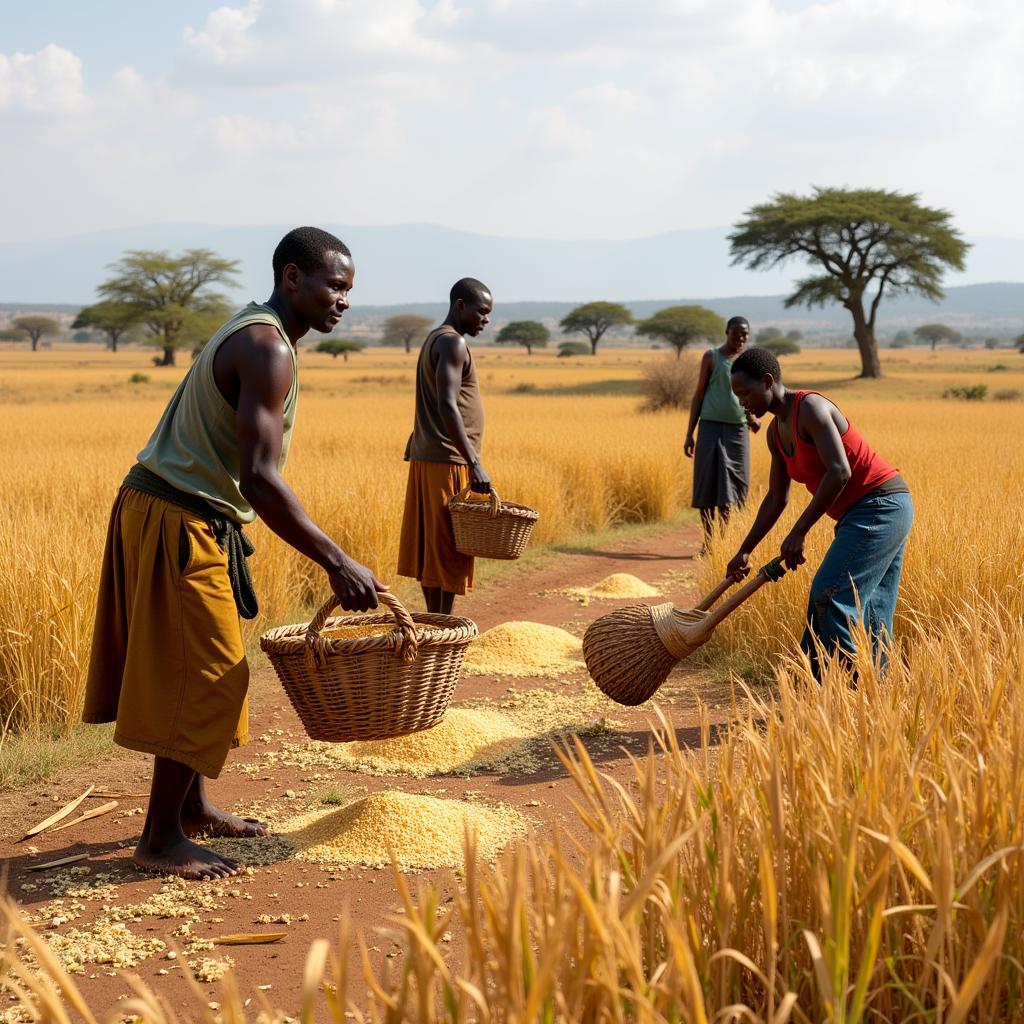African Crops Farming: A Journey Through the Continent’s Agricultural Heart
African Crops Farming is the backbone of many economies and livelihoods across the continent. From ancient grains to modern cash crops, the land sustains millions and plays a vital role in global food security. This article delves into the diverse world of African agriculture, exploring its challenges, innovations, and potential.
 African farmers harvesting sorghum in a traditional way
African farmers harvesting sorghum in a traditional way
The diversity of African crops farming is truly remarkable. Across the continent, variations in climate and soil allow for a vast range of crops, each with its unique story and contribution to the local and global food system. Staple crops like sorghum, millet, and cassava are deeply ingrained in local cultures and provide essential nutrients for millions. These crops, often overlooked in global markets, are incredibly resilient and adapted to harsh conditions, highlighting the ingenuity of African farmers. Alongside these traditional staples, cash crops like cocoa, coffee, and cotton play a significant role in international trade, connecting African economies with the rest of the world.
The Challenges and Triumphs of African Crops Farming
African farmers face a unique set of challenges. Climate change impacts like droughts and unpredictable rainfall patterns threaten crop yields and food security. Limited access to modern farming techniques, financing, and infrastructure further complicates matters. Despite these hurdles, African farmers continue to innovate. Traditional farming methods, passed down through generations, are combined with new technologies to improve yields and sustainability. Organizations and governments are working to empower farmers with training, resources, and market access, fostering growth and resilience in the agricultural sector.
 Modern irrigation system being used in an African farm
Modern irrigation system being used in an African farm
“The resilience of African farmers is truly inspiring,” says Dr. Abimbola Olufemi, agricultural economist at the University of Ibadan. “They are constantly adapting to changing conditions, finding new ways to thrive despite the challenges.”
Exploring Key Crops and Farming Techniques
African crops farming goes beyond just sustenance. It is a tapestry of knowledge, tradition, and innovation. Let’s delve deeper into some key crops and the methods employed in their cultivation:
- Sorghum: A drought-resistant grain vital for food security in arid and semi-arid regions.
- Millet: Another resilient grain, adaptable to various soil types and climates.
- Cassava: A starchy root crop, a staple food for millions across the continent.
- Cocoa: A major cash crop, integral to the global chocolate industry.
- Coffee: Grown in several African countries, providing livelihoods and contributing to global trade.
Traditional farming methods are often combined with modern practices. For instance, intercropping, where different crops are grown together, is a common practice that enhances soil health and improves yields. Conservation agriculture, which minimizes soil disturbance, is also gaining traction, contributing to sustainable farming practices.
The Future of African Crops Farming
The future of African crops farming holds immense potential. Investing in research, technology, and infrastructure can unlock significant growth and improve food security. Empowering farmers with knowledge and resources is key to driving innovation and sustainable practices. By fostering collaboration between governments, organizations, and farmers, Africa can harness the full potential of its agricultural sector and contribute to a more food-secure world.
The South African Plateau is a prime example of the continent’s agricultural potential. Check out more about this region by clicking here: south african plateau.
For a glimpse into everyday life in some African countries, visit: african cuntry life.
“The future of food security in Africa lies in empowering the next generation of farmers,” adds Professor Fatima Hassan, an agricultural scientist based in Kenya. “Investing in their education and training is crucial for building a resilient and sustainable agricultural sector.”
The 2017 Global Hunger Index provided valuable insights into food security across African nations. Learn more here: african countriesglobal hunger index 2017.
Are you interested in learning about the role of ants in African ecosystems? This article might interest you: african ant called as enemy any why.
In conclusion, African crops farming is a dynamic and vital sector. By addressing challenges and investing in opportunities, the continent can strengthen its agricultural base, improve food security, and drive economic growth. Embracing sustainable practices and empowering farmers are crucial to realizing the full potential of African agriculture and contributing to a thriving global food system. Explore the world of african farmer game to understand the challenges and opportunities faced by farmers in Africa.
FAQ
- What are the major crops grown in Africa?
- How does climate change impact African agriculture?
- What are some traditional farming techniques used in Africa?
- What are the challenges faced by African farmers?
- How can technology improve African crops farming?
- What is the role of women in African agriculture?
- What are the future prospects for African crops farming?
Further Information
For more information on other related topics, please explore the resources available on our website.
Contact Us
When you need assistance, please contact us at Phone: +255768904061, Email: kaka.mag@gmail.com or visit us at Mbarali DC Mawindi, Kangaga, Tanzania. We have a 24/7 customer service team.



